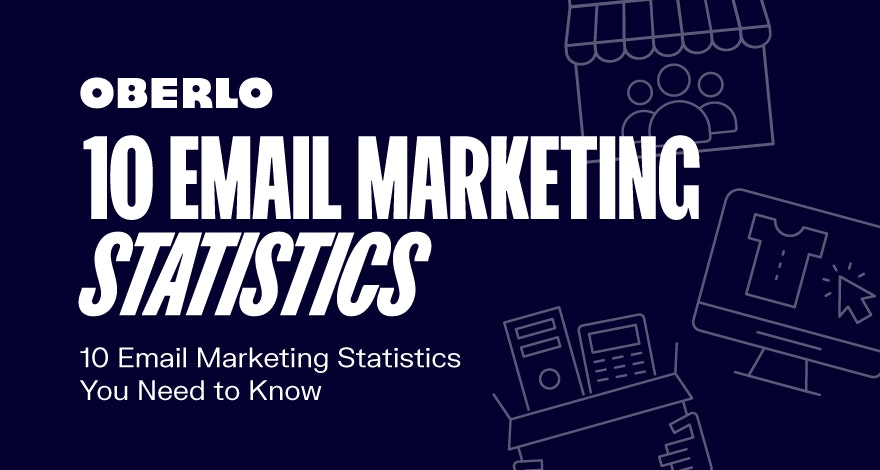When your resources are limited, you want to be sure that you’re not wasting any of your precious time and money when starting a business. But when it comes to marketing, your business can’t afford to ignore a tool as valuable as email marketing.
But with so many other ways to reach your customers, why should you be relying on email marketing anyway? Is it even worth it? In short: yes.
The impact of email marketing can do much more than just getting messages into inboxes. There’s a lot of buzz surrounding email marketing and its benefits, but what do the email marketing stats suggest? Well, the numbers say it all when it comes to proving the credibility of email marketing.
P.S. If you want to become an email marketing master, don’t forget to check out our email marketing strategy guide.
Let’s take a look at what email marketing is, and then jump on to the top email marketing stats that you need to know in 2023.
Post Contents
- What is Email Marketing?
- 1. The Widespread Usage of Email
- 2. Billions of Emails Are Sent Daily
- 3. Email Delivers a Strong Return on Investment
- 4. Use of Email for Content Distribution
- 5. Email Marketing Helps to Grow Your Business
- 6. Welcome Emails Have a High Open Rate
- 7. Personalization Works Wonders For Email
- 8. The Power of Abandoned Cart Emails
- 9. Interactive Emails Are the Way Forward
- 10. Customers Like to Hear From You
- Summary: Email Marketing Statistics
- Want to Learn More?



What is Email Marketing?
Email marketing is the use of email to promote products or services. But it’s not just limited to that. You can use email marketing to develop relations with current customers, and/or to reach out to potential customers. Email marketing allows businesses to keep their customers informed, and to customize their marketing messages accordingly. Think of it as one of the most cost-effective and conversion-rich forms of digital marketing today. It’s potent, persuasive, and gets your ecommerce store great results.
Here’s a list of interesting email marketing statistics that go to show just how valuable email marketing is.
→ Click Here to Launch Your Online Business with Shopify
1. The Widespread Usage of Email
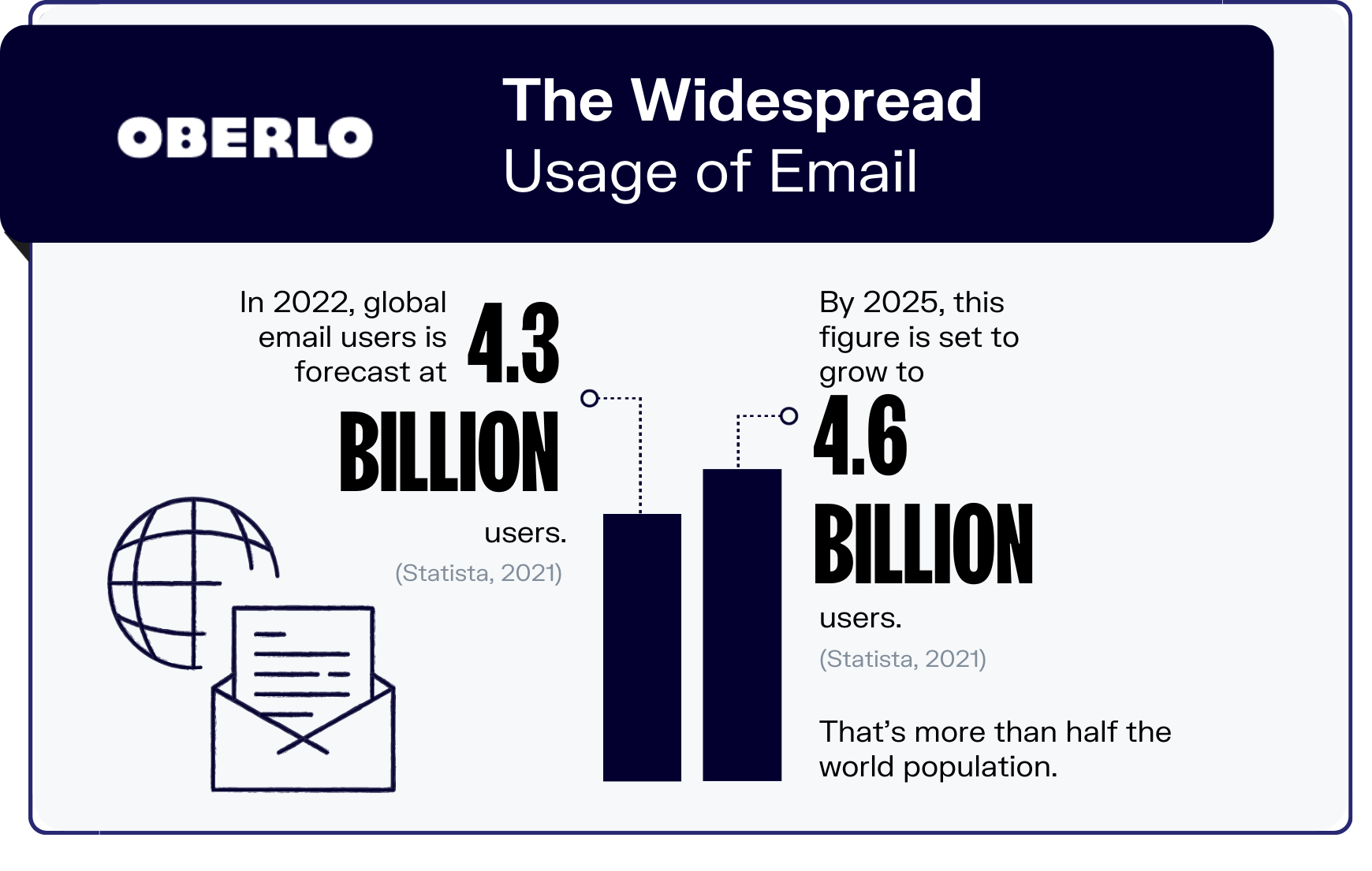
Email has made its way from being simple messages between academics to widespread global usage. In 2022, the number of email users worldwide was forecast at 4.3 billion (Statista, 2021). This figure is set to grow to 4.6 billion in 2025, making up more than half of the expected world population.
This statistic clearly shows that email marketing is an opportunity that brands shouldn’t be missing out on.
If you’re doing business in the developed world, your customers are using email, and you should be as well. No matter how small your business is, you have the power to reach people through email marketing 24 hours a day, 365 days a year.
The advantage of reduced time and effort that comes with email can help you structure your email marketing strategy in a better way and connect with your audience in an instant.
2. Billions of Emails Are Sent Daily
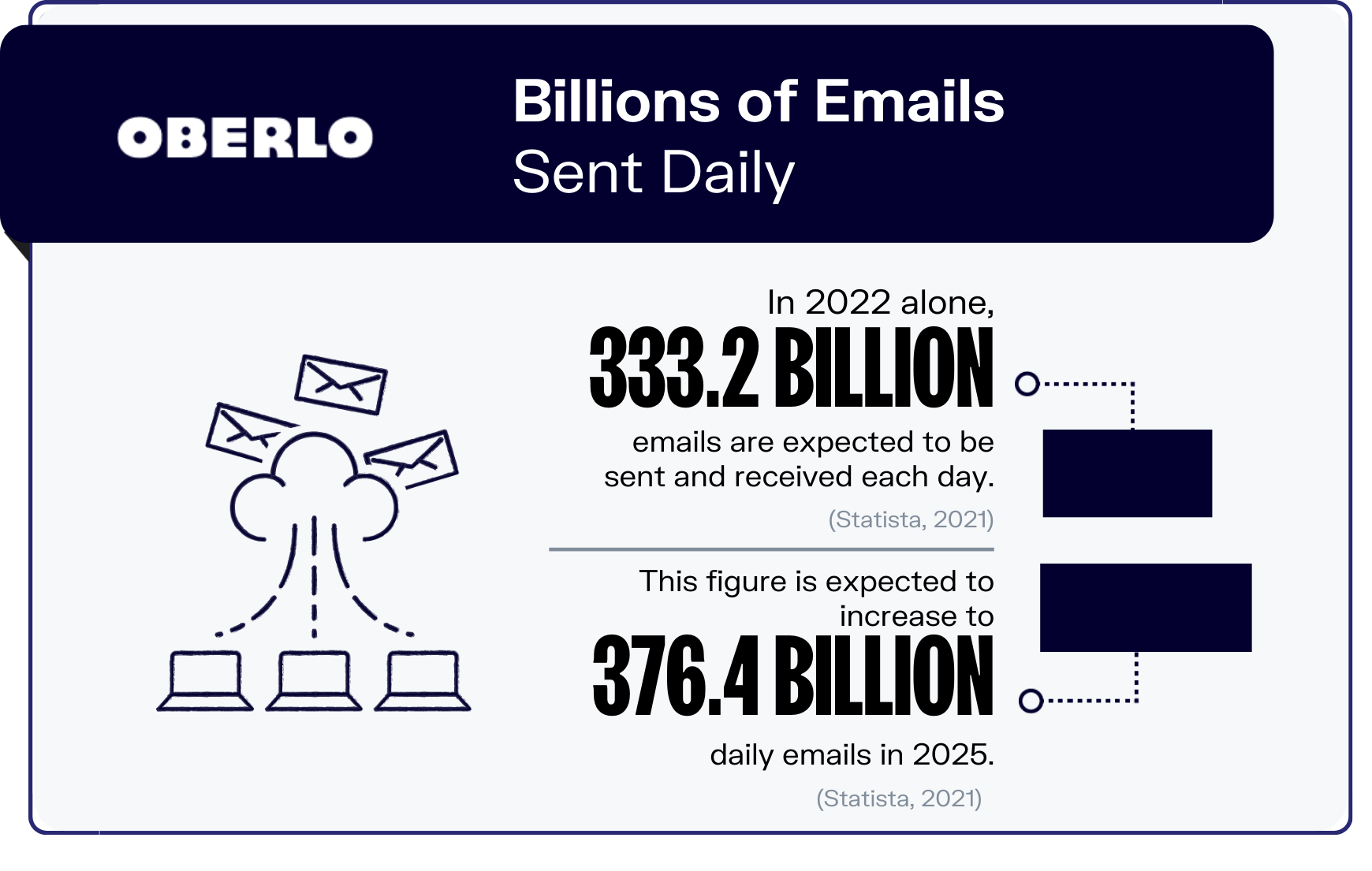
In 2022 alone, 333.2 billion emails were expected to have been sent and received each day (Statista, 2021). That’s a staggering amount of daily emails.
That’s not all. This figure is also expected to increase to over 375 billion by 2025. This email marketing statistic will likely prove to you that email marketing isn’t going anywhere soon. In fact, it’s growing.
Over the years, many new forms of communication have emerged. Despite this emergence, email marketing has remained strong and is continuing to grow. With this email marketing stat in mind, it’s hard to ignore the potential of a great email marketing campaign.
3. Email Delivers a Strong Return on Investment
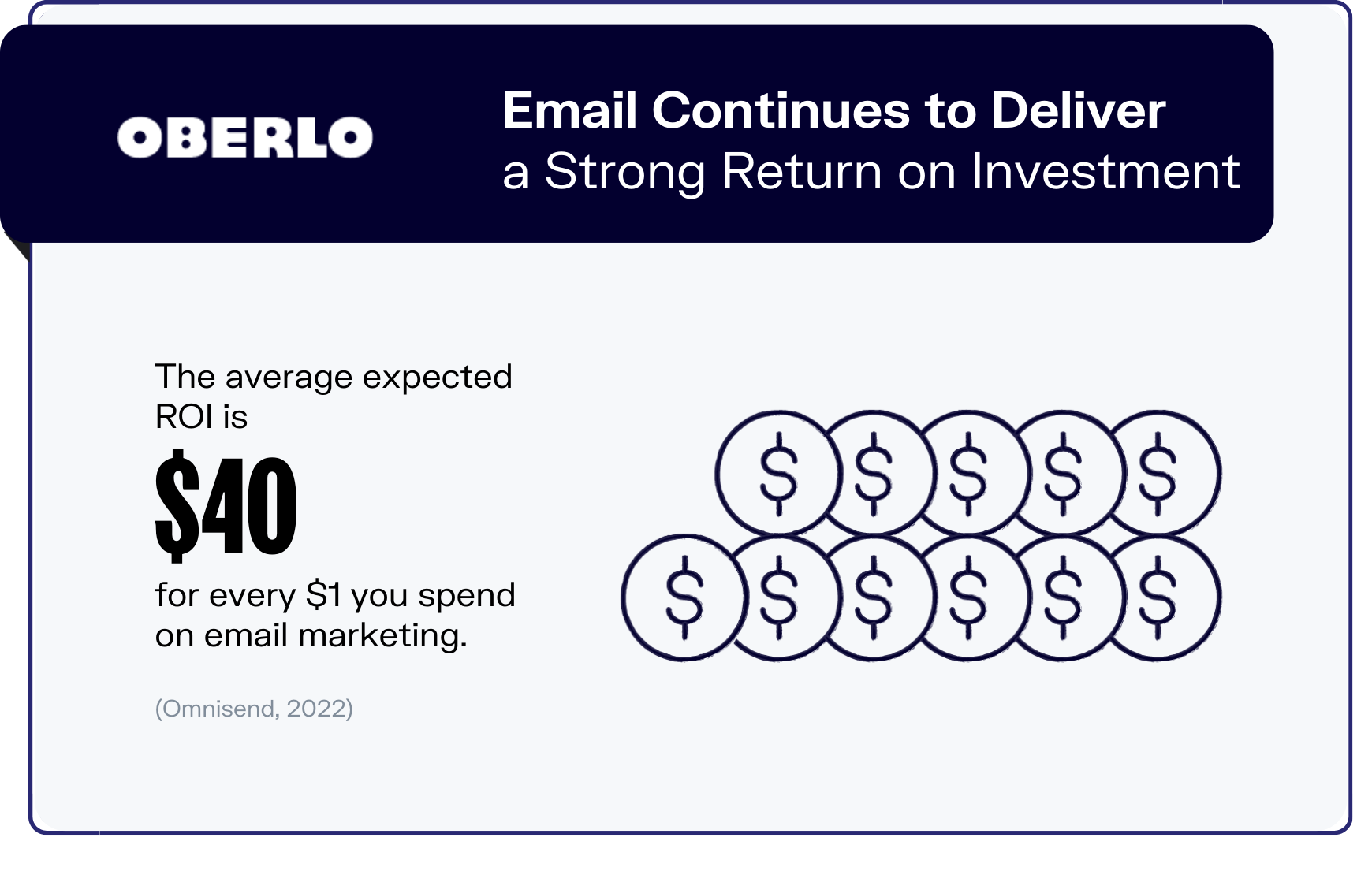
There’s no surprise that with the widespread popularity and indisputable benefits of email marketing, the return on investment is massive. A well-thought-out email marketing strategy will make you money.
For every $1 you spend on email marketing, you can expect an average return of $40 (Omnisend, 2022). There are loads of email marketing benefits, but this one surely tops the charts for keeping your business steady.
The ROI of email marketing is also significantly higher than other channels. In comparison, the ROI of SEO and keyword ads are $22.24 and $17, respectively.
4. Use of Email for Content Distribution
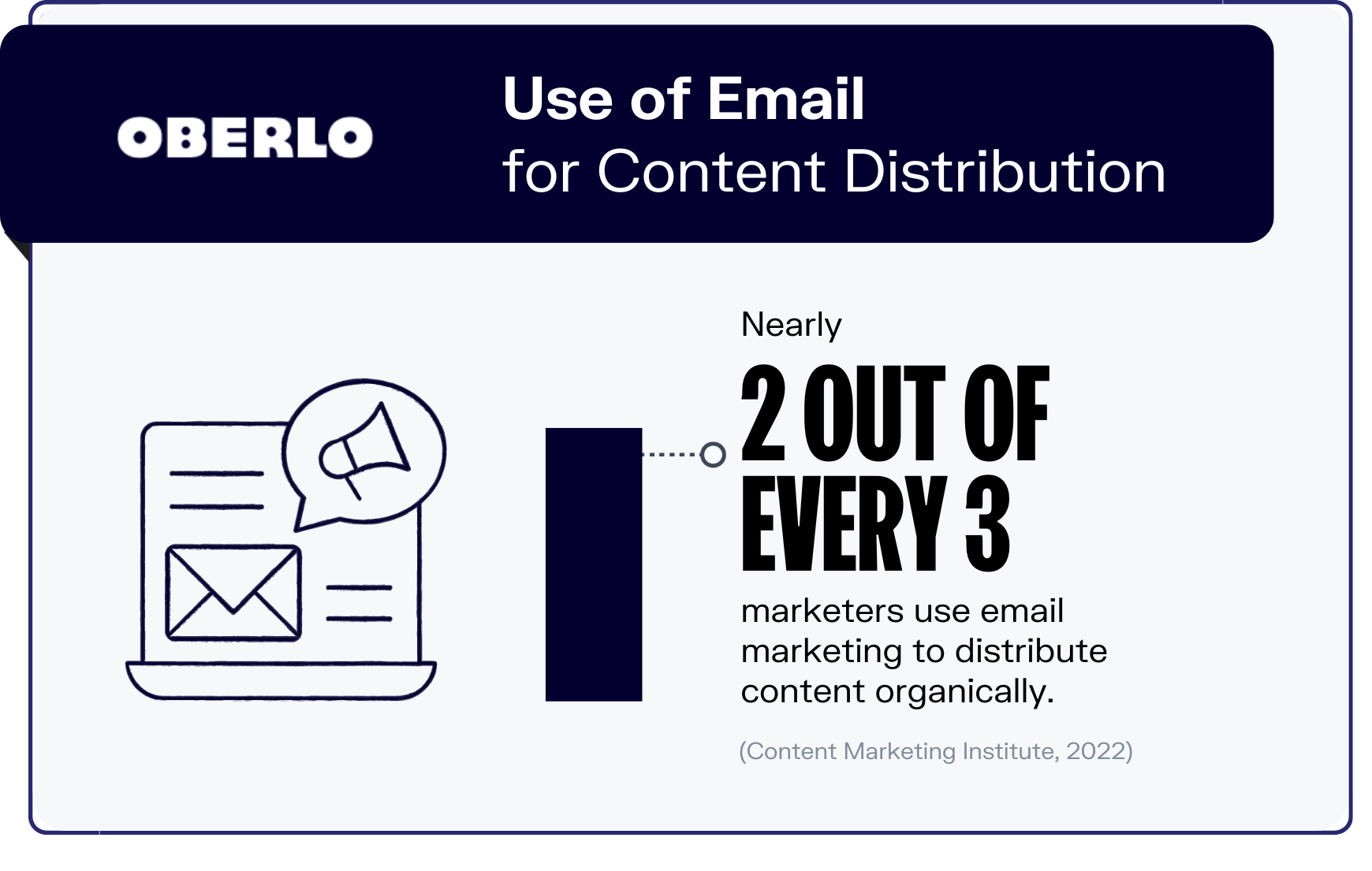
With such a strong ROI, it should come as no surprise that email marketing is one of marketers’ favorite content distribution methods.
The latest statistics show that as many as 69 percent of marketers use email marketing to disseminate their content (Content Marketing Institute, 2022). This makes email the third most popular content distribution channel, just behind a company’s website and blog, with 90 percent and 78 percent, respectively.
It’s also ahead of other platforms like events—be it virtual or in-person—and online communities.
Email marketing offers so many benefits as a content distribution channel that marketers aren’t just using it organically—more than one-third of them (35 percent) are also engaging in paid collaborations to promote their content to their partners’ email databases.
In fact, email is so popular among marketers that email engagement is one of the top metrics to evaluate content performance. 83 percent of marketers say they look at email engagement metrics such as open rates, click rates, and downloads to determine how successful a piece of content is, more so than conversions and social media analytics.
5. Email Marketing Helps to Grow Your Business
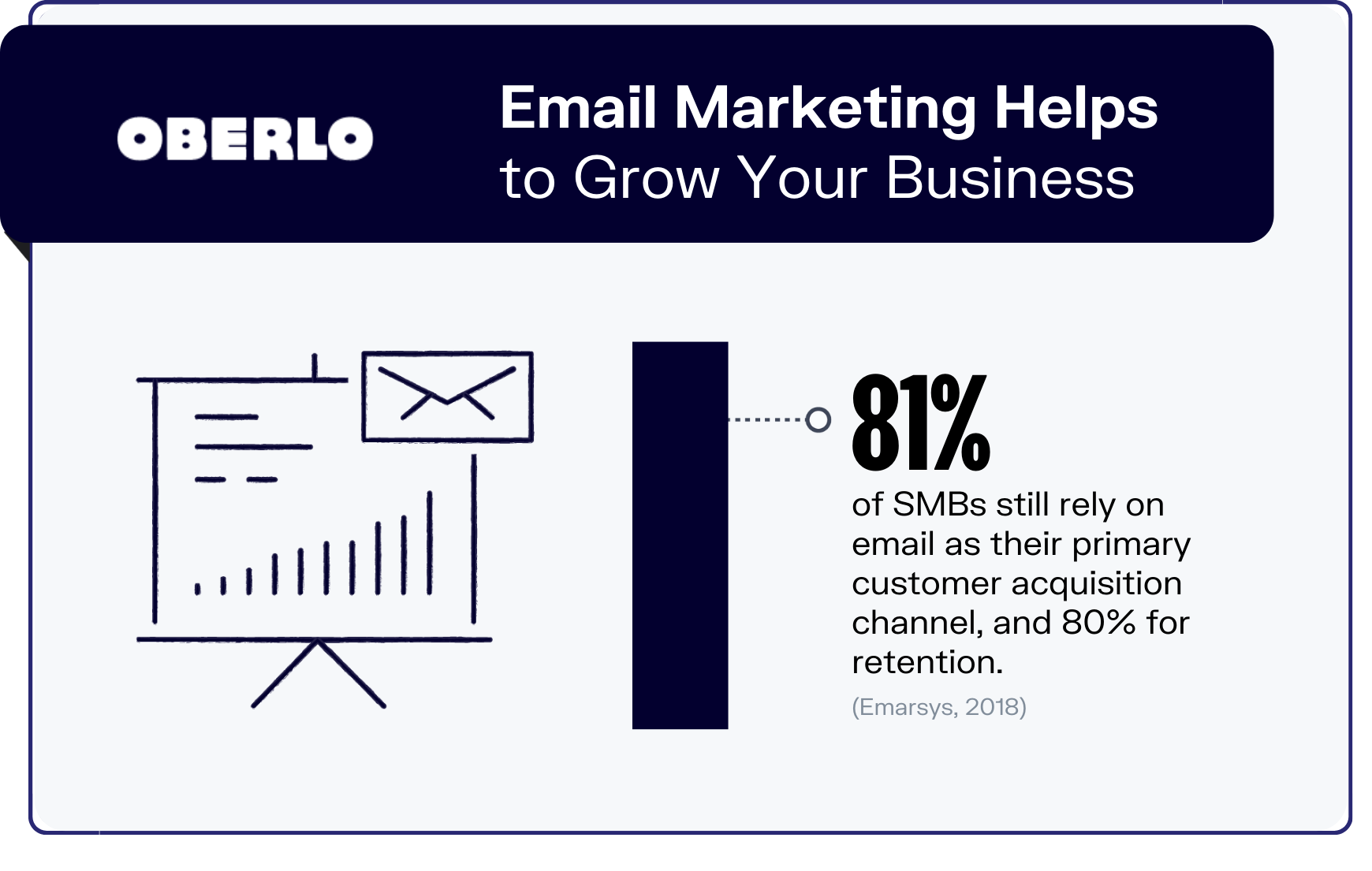
Email continues to be the main driver of customer retention and acquisition for small and midsize businesses. According to the data, 81% of SMBs still rely on email as their primary customer acquisition channel, and 80% for retention (Emarsys, 2018).
There might be a lot of talk about social media, and likes, shares, and tweets, but that doesn’t mean that email marketing is becoming any less valuable. Research findings from this study show that email marketing tops the chart in comparison to organic search, paid search, and social media when it comes to customer acquisition and retention. Not to say that Facebook isn’t important for your business, but if you’re looking for direct impact and reach, there’s no competition with email marketing.
6. Welcome Emails Have a High Open Rate
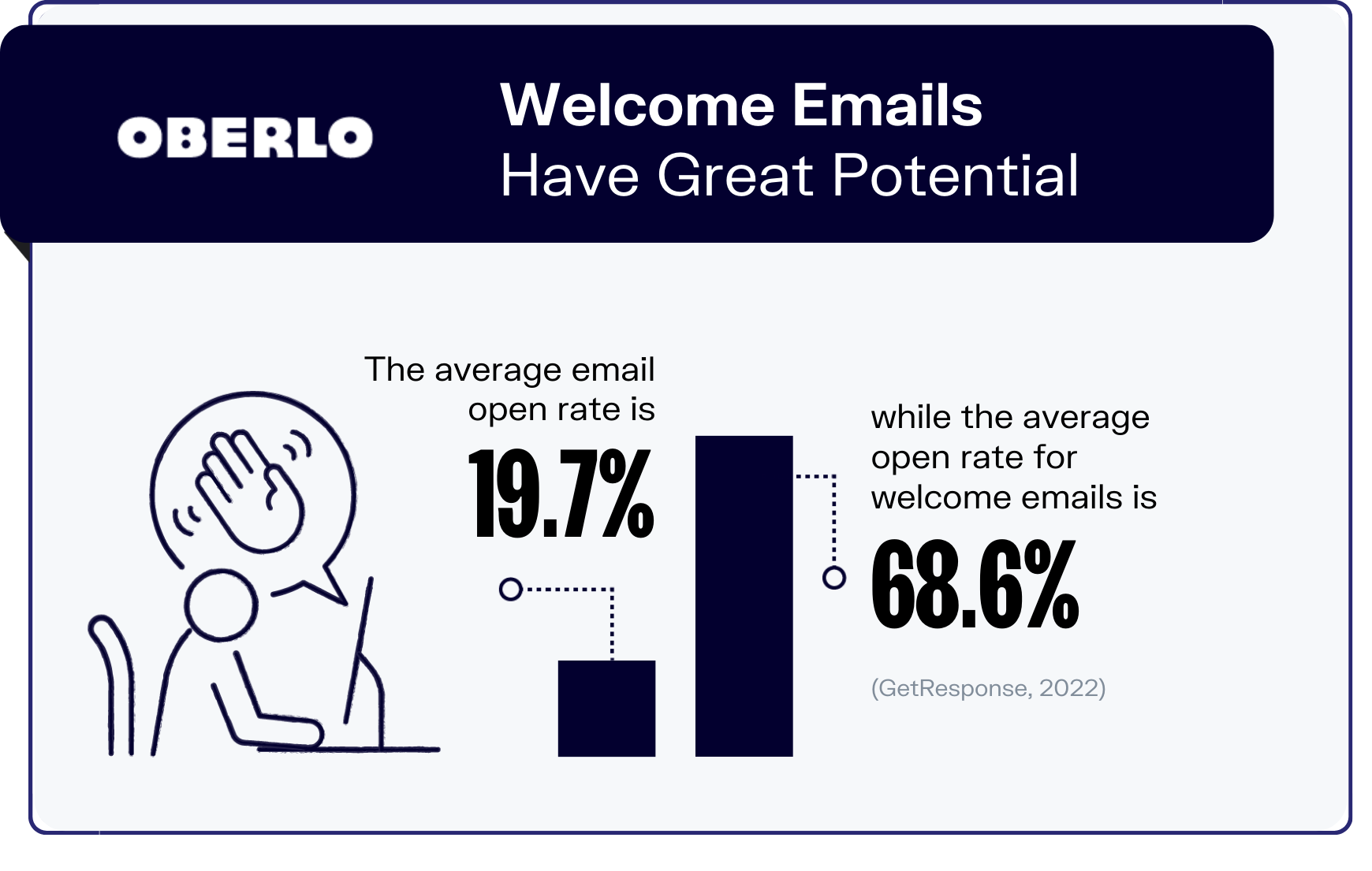
Open rates are one of the best ways to tell how well your email marketing strategy is performing. This shows how many people are opening your email. After all, who doesn’t want their email marketing campaign to work wonders?
But what percentage of your audience even opens the emails that they get? Let’s talk stats. The average email open rate for businesses across all industries is 19.7% (GetResponse, 2022). You can use this to your advantage when you’re building your email campaign for your growing audience.
Welcome emails, however, have a much higher open rate of 68.6%, which highlights their importance. With such a high open rate, brands may want to consider slipping in some useful information they want their audience to know about in the welcome emails.
7. Personalization Works Wonders For Email
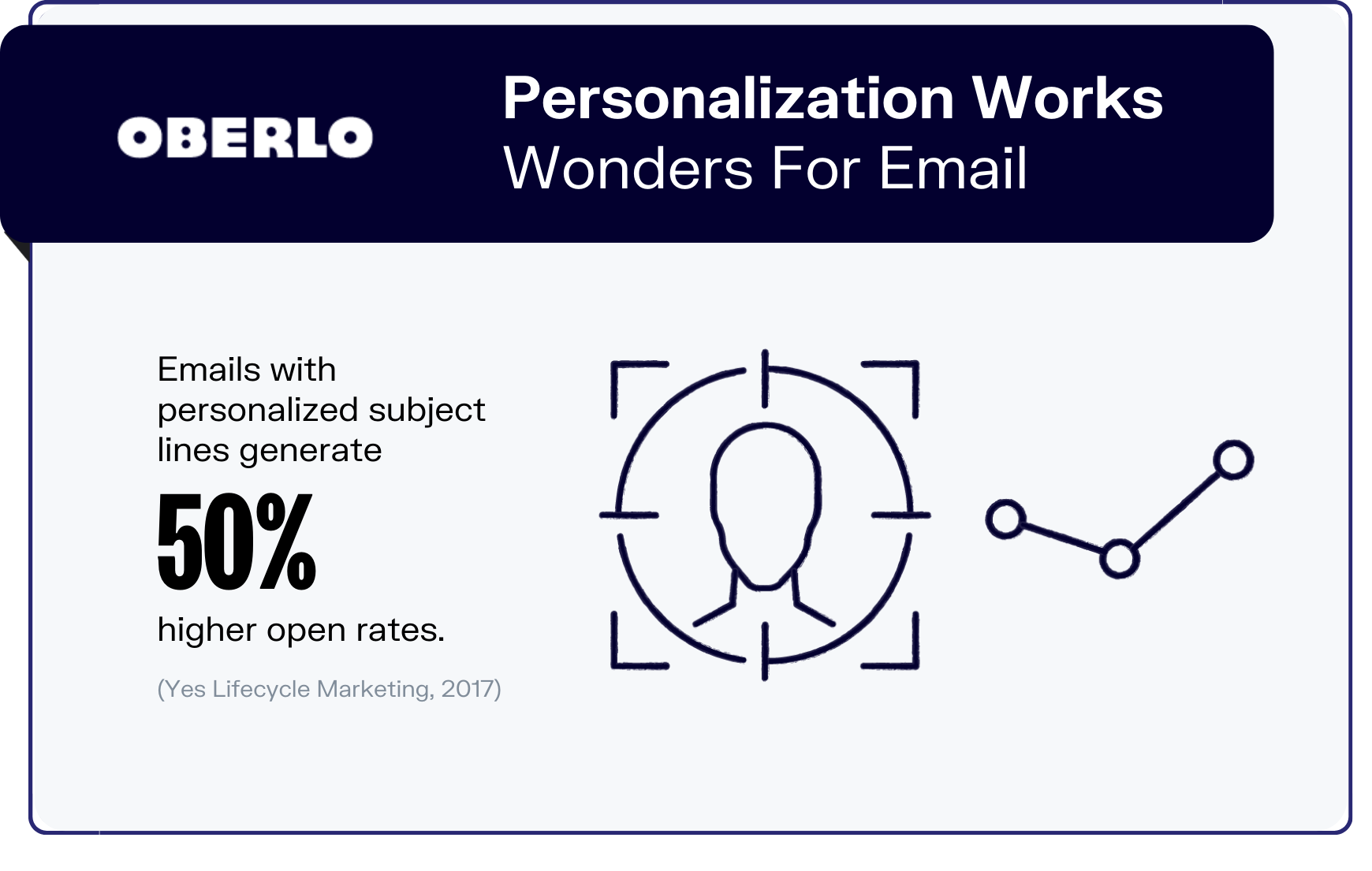
As the previous stat shows, the average email open rate is 20.81%. But if you personalize your emails, you’ll start to see the incredible impact that personalization can have. Emails with personalized subject lines generate 50% higher open rates (Yes Lifecycle Marketing, 2019).
So, a great email marketing tip would be to customize your greeting and subject line to include individual names when you send out emails. If that’s too much of a task, you could try personalizing your emails with the company’s name, industry, or a topic of interest.
8. The Power of Abandoned Cart Emails
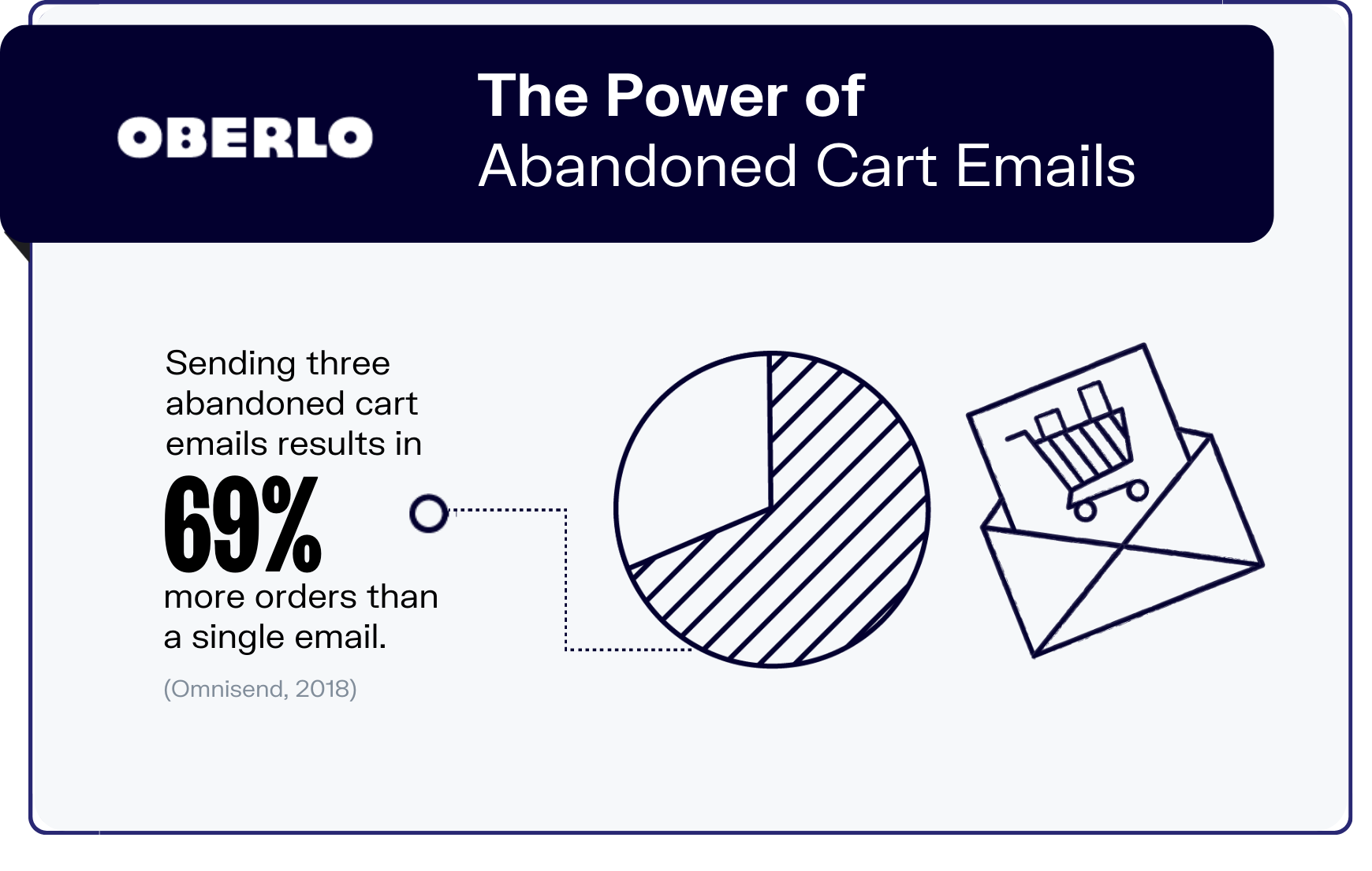
An abandoned cart email is a follow-up email sent to someone who has added items to their cart, and gotten through a part of the checkout, but then left the site without purchasing the items. A lot of people put items in their online shopping cart, only to then leave without completing the purchase. Your business could work around this by sending abandoned cart emails and retrieving your lost potential for transactions.
Do abandon cart emails work? The statistic is here to back this claim up. Sending three abandoned cart emails results in in 69% more orders than a single email (Omnisend, 2018). This type of ecommerce email is one of the most effective for boosting revenue.
9. Interactive Emails Are the Way Forward
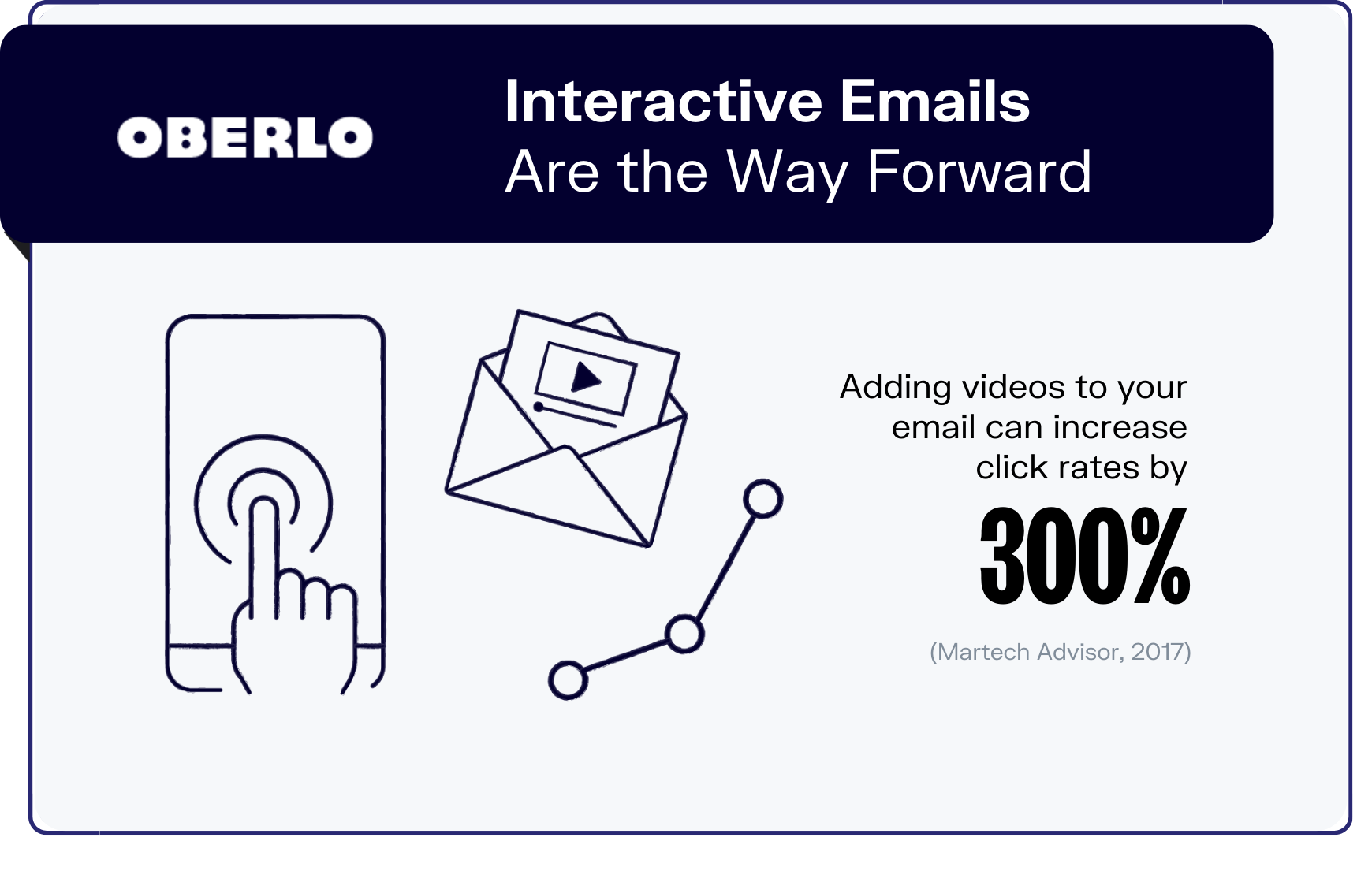
Your emails should create user engagement. Gone are the days when your email marketing campaign needs to be limited to a newsletter format. Marketers are looking for better engagement in the form of interactive content.
Reports have shown that adding videos to your email can increase click rates by 300% (Martech Advisor, 2017). That’s a shocking number. Marketers also tend to include sliders, collapsible menus, and GIFs to make their emails look better to customers. Also, don’t forget to make sure that all of your interactive emails are optimized for mobile devices.
10. Customers Like to Hear From You
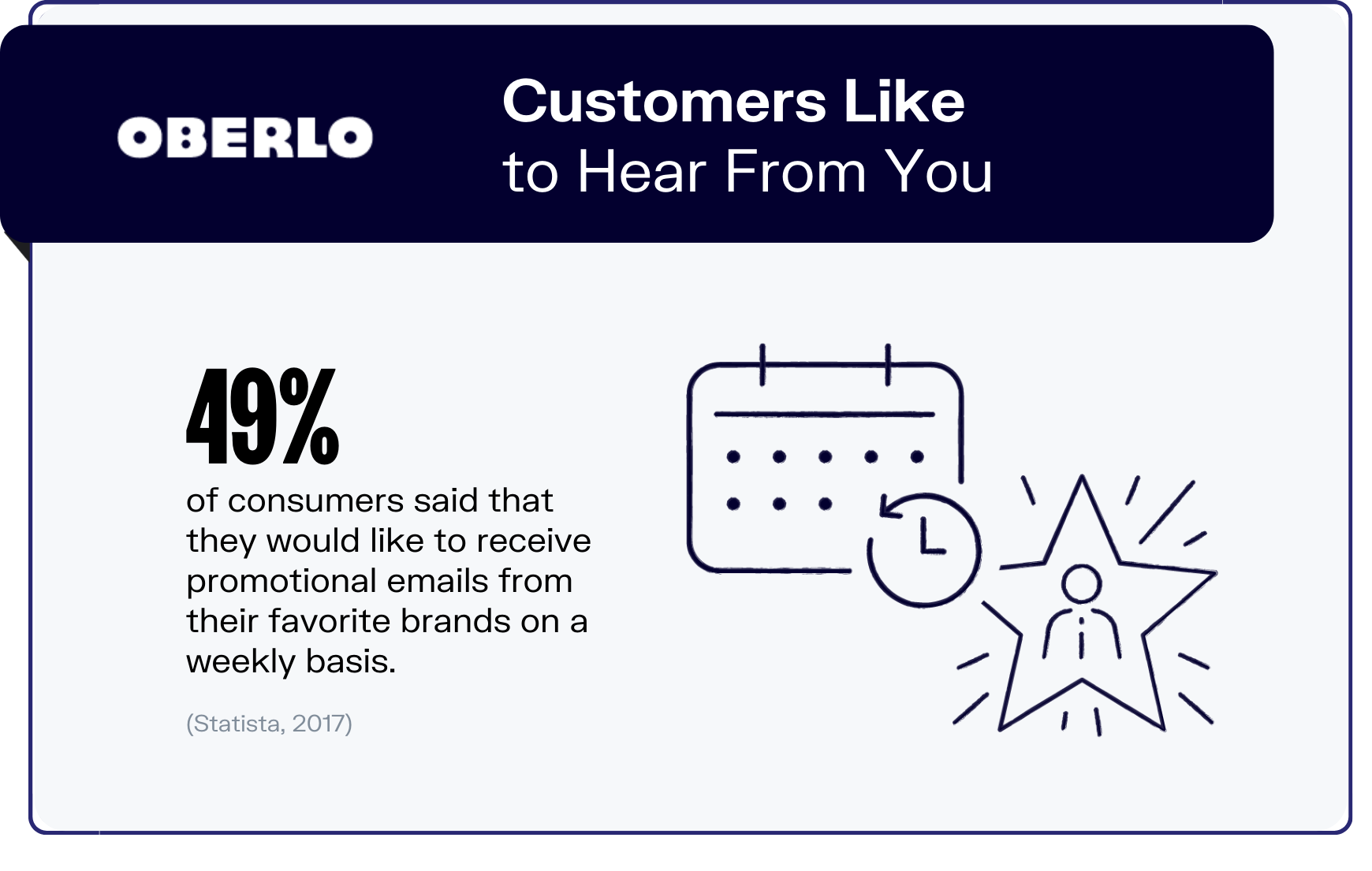
When looking at the frequency with which consumers would like to receive brand emails, 49% (Statista, 2017) of consumers said that they would like to receive promotional emails from their favorite brands on a weekly basis. This email marketing statistic is especially handy when you’re worrying about sending emails to your customers too often. Your audience likes to hear from you, and apparently, they’re happy to hear from you via email.

Summary: Email Marketing Statistics
Here’s a summary of the email marketing statistics for 2023:
- The number of active email users is forecast to reach 4.6 billion in 2025.
- 333.2 billion emails are sent and received each day in 2022.
- The average expected ROI is $40 for every $1 you spend on email marketing.
- Two out of every three marketers use email marketing to distribute content organically.
- 81% of small businesses rely on email as their primary customer acquisition channel, and 80% for retention.
- The average email open rate is 19.7%, while the average open rate for welcome emails is 68.6%.
- Emails with personalized subject lines generate 50 percent higher open rates.
- Sending three abandoned cart emails results in 69 percent more orders than a single email.
- Videos added to your email increase click rates by 300 percent.
- 49 percent of consumers would like to receive promotional emails from their favorite brands.



Want to Learn More?
- How to Start an Online Business From Home
- How to Make Money on YouTube: 5 Top Tips
- The Ultimate SEO Checklist for 2023
- How To Sell on eBay for Beginners in 2023
Is there anything else you’d like to know about email marketing statistics and wish was included in this article? Let us know in the comments below!
